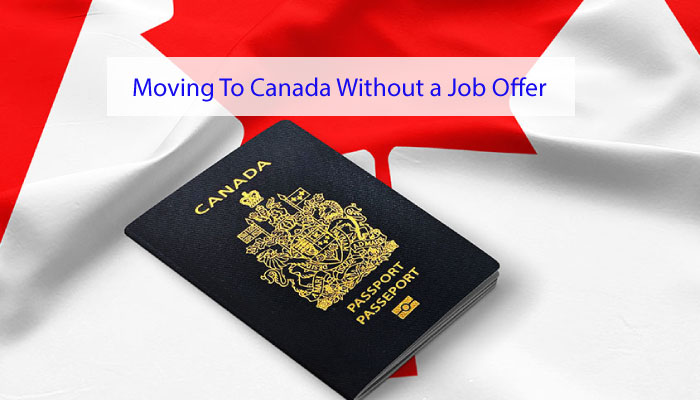Moving to Canada Without a Job Offer: Your Comprehensive Guide for 2023
Canada has long been a dream destination for individuals seeking new opportunities, a high quality of life, and a welcoming environment. While many immigration pathways to Canada often require a job offer, there are indeed ways to make the move without securing employment in advance. In this comprehensive guide, we will explore various options for immigrating to Canada without a job offer in 2023. Whether you’re a skilled professional, an entrepreneur, or have family ties in Canada, there might be a suitable pathway for you. So, let’s dive into the details.

Understanding the Canadian Immigration Landscape
Before we delve into specific immigration programs, it’s essential to grasp the overall framework of Canada’s immigration system. Canada offers numerous immigration pathways designed to attract individuals who can contribute to the country’s economy and society. These pathways are divided into federal and provincial programs.
Federal Programs
Canada’s federal immigration programs are managed through the Express Entry system. Express Entry is a points-based system that assesses candidates based on factors such as age, education, work experience, language proficiency, and adaptability. Here are the key federal programs within Express Entry that do not require a job offer:
1. Federal Skilled Worker Program (FSWP)
The FSWP targets individuals with specific skills and experience. To qualify, candidates must meet the minimum eligibility criteria, including a certain level of language proficiency and a credential assessment.
2. Federal Skilled Trades Program (FSTP)
For those in skilled trades, the FSTP is a viable option. It is designed for individuals who have experience in specific trades and meet the program’s requirements.
3. Canadian Experience Class (CEC)
If you have prior work experience in Canada, the CEC may be the pathway for you. This program is tailored to individuals who have gained valuable Canadian work experience.
Provincial Nominee Programs (PNPs)
In addition to federal programs, Canada’s provinces and territories also have their own immigration streams. Some PNPs offer opportunities to immigrate without a job offer. Here are a few examples:
4. Ontario Immigrant Nominee Program (OINP)
OINP offers various streams that cater to different skillsets and backgrounds. Some of these streams do not require a job offer but have specific eligibility criteria.
5. Saskatchewan Immigrant Nominee Program (SINP)
SINP offers pathways for both skilled workers and entrepreneurs. Some streams under SINP do not mandate a job offer but may have other requirements.
6. Nova Scotia Nominee Program (NSNP)
NSNP has streams for skilled workers and entrepreneurs, and some of these streams do not require a job offer.
Alternative Pathways to Consider
In addition to the federal and provincial programs mentioned above, there are alternative pathways to explore for moving to Canada without a job offer:
7. Canadian Investor Program
If you have significant net worth and business experience, the Canadian Investor Program might be suitable. This program focuses on attracting individuals who can make substantial investments in the Canadian economy.
8. Family Sponsorship
If you have family members who are Canadian citizens or permanent residents, they may be able to sponsor you for immigration. Family ties can be a powerful pathway to Canada.
9. Bridging from a Student or Work Permit
If you are in Canada on a temporary student or work permit, you may be able to transition to permanent residency through specific bridging programs. These programs can be an excellent way to secure your future in Canada.
10. Entrepreneur Programs
Some provinces and territories in Canada offer entrepreneur programs that allow individuals to establish or invest in businesses. These programs can lead to permanent residency without the need for a job offer.
Conclusion
In 2023, immigrating to Canada without a job offer is indeed possible through various federal and provincial immigration programs, as well as alternative pathways such as family sponsorship and investor programs. Each program has its own eligibility criteria and requirements, so it’s crucial to thoroughly research and determine the best option that aligns with your qualifications and goals.
Now that you have a comprehensive understanding of how to move to Canada without a job offer, you can take the next steps toward making your Canadian dream a reality.
Frequently Asked Questions (FAQs)
FAQ 1: Can I apply for multiple immigration programs simultaneously?
Yes, you can apply for multiple immigration programs simultaneously, but it’s essential to ensure that you meet the eligibility criteria for each program. Keep in mind that some provinces may have specific restrictions on applying to multiple streams within their Provincial Nominee Programs (PNPs).
FAQ 2: How long does the immigration process take without a job offer?
The processing times for immigration applications can vary widely depending on the program, your country of origin, and the volume of applications. It’s advisable to check the official government websites for the most up-to-date processing time estimates.
FAQ 3: Do I need to hire an immigration consultant or lawyer for my application?
While it’s not mandatory to hire an immigration consultant or lawyer, many applicants choose to do so to ensure that their applications are accurate and complete. Consulting with professionals can help streamline the process and reduce the risk of errors.
FAQ 4: Are there any language requirements for immigration to Canada without a job offer?
Yes, language proficiency is a crucial factor in most Canadian immigration programs. You may need to prove your proficiency in English and/or French through standardized language tests such as IELTS or CELPIP.
FAQ 5: Can I apply for Canadian citizenship after obtaining permanent residency without a job offer?
Yes, once you have obtained permanent residency in Canada, you can become eligible to apply for Canadian citizenship after meeting specific residency requirements. It’s important to maintain your permanent resident status while residing in Canada to be eligible for citizenship.
Remember that immigration policies and requirements can change over time, so it’s advisable to check the official government websites or consult with immigration professionals for the most current information and guidance.






